<> Zizula hylax (Fabricius, 1775) <>
the Tiny Grass Blue ผีเสื้อฟ้าจุดขอบ
Click on any photo to see all photos full size in Lightbox
Additions and corrections to the information provided on this page is always welcome. Please use the Contact form.
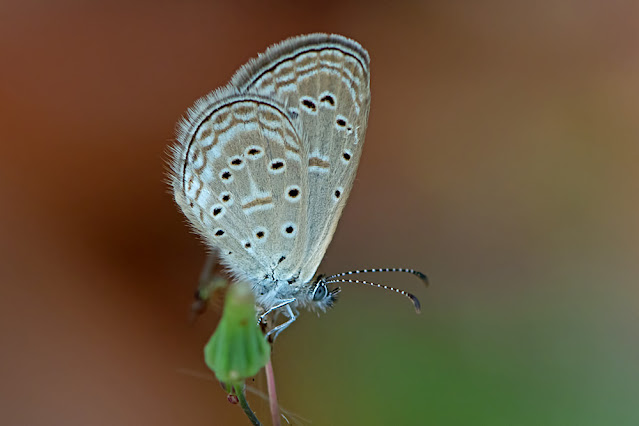
Photo taken at Chiang Dao Nature Sanctuary, Chiang Mai, Thailand 540m a.s.l.

Zizula hylax is quite common across most of the countries in the region and is one of the smallest butterflies in the world, hence its English common name. It really is tiny with a maximum wingspan of just 15mm and can therefore sometimes be quite difficult to spot. Male and female are alike except for the upper wing colour where the female is entirely brown whilst the male has a large blue area on both forewings and hindwings. The underside of the wings are more or less identical. It is a very active butterfly, fast flying but always staying very low, just above ground level. Both sexes puddle for minerals and visit flowers for nectar.
The species is multivoltine and has a very short life cycle of little more than two weeks. This means that there are probably many broods per annum. The adult female lays her eggs singly on the underside of a leaf or flower on the host plant. She lays up to 10 eggs at a time but each one in a different location. As you would expect the resulting larvae and pupae are also very tiny, no more than 7mm in length.
Synonyms and previously used names: Papilio hylax, Papilio donovani, Zizera gaika, Lycaena cleodora, Lycaena gaika, Lycaena perparva, Lycaena mylica
Taxonomy: Animalia - Arthropoda - Insecta - Lepidoptera - Lycaenidae - Polyommatinae - Zizula - hylax
Regional subspecies: Zizula hylax dampierensis (Papua-Indonesia), Zizula hylax hylax (India, Myanmar, N.Thailand, Laos, Cambodia, Vietnam, S.China, Taiwan, Philippines), Zizula hylax pygmaea (S.Thailand, Malaysia, Singapore, Indonesia)
Regional Distribution: Bhutan, India, Bangladesh, Myanmar, Thailand, Laos, Cambodia, Vietnam, China, Taiwan, Malaysia, Singapore, Indonesia, Philippines
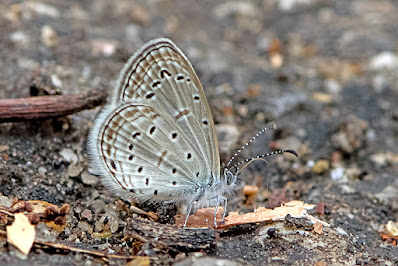 |
Doi Suthep-Pui National Park, Chiang Mai, Thailand 460m a.s.l. |
Habitat: Zizula hylax is found in a wide variety of different habitats including open areas within forests, forest edges, grassland, and urban parks and gardens. Usually seen at low to moderate elevations but has been recorded up to 1900m a.s.l.
Flight time: most of the year depending on location Wingspan: 11-15mm
Life History: egg 3 days instar 1 3 days instar 2 3-4 days instar 3 3 days instar 4 1-2 days instar 5 n/a pupa 5 days Total egg to adult 16-18 days
All times are approximate and can vary depending on the season and on the host used.
Larval Hosts: Dicliptera chinensis, Hygrophila angustifolia, Hygrophila auriculata, Hygrophila difformis, Hygrophila erecta, Hygrophila ringens, Hygrophila serpyllum, Nelsonia canescens, Phaulopsis dorsiflora, Ruellia patula, Ruellia prostrata, Ruellia repens, Ruellia simplex, Ruellia tuberosa, Strobilanthes capitata, Strobilanthes rosea, Strobilanthes thomsonii (Acanthaceae), Aeschynomene americana, Grona triflora, Mimosa pudica (Fabaceae), Lantana camara (Verbenaceae), Oxalis corniculata (Oxalidaceae), Tribulus terrestris (Zygophyllaceae).
Actual host plant used depends upon location and availabilty of plant species.
Adult Food Sources: Nectar - Ageratum conyzoides, Emilia sonchifolia, Sphagneticola trilobata, Tridax procumbens, Zinnia elegans (Asteraceae), Varronia cylindristachya (Boraginaceae), Oldenlandia corymbosa (Rubiaceae), Allium tuberosum (Amaryllidaceae), Cuphea hyssopifolia (Lythraceae), Oxalis barrelieri (Oxalidaceae), Lantana camara, Phyla nodiflora, Stachytarpheta indica (Verbenaceae), Cleome viscosa (Cleomaceae), Sida acuta (Malvaceae), Dendrobium moniliforme (Orchidaceae), Cyananthus incanus (Campanulaceae), Aeschynomene americana (Fabaceae). Other - mud puddling
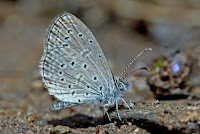 |
| Lamnamkok National Park, Chiang Rai, Thailand |
 |
| Chiang Dao Nature Sanctuary, Chiang Mai, Thailand ♂ |
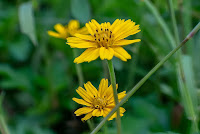 |
| Sphagneticola trilobata, a nectar source |
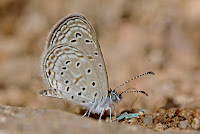 |
| Lamnamkok National Park, Chiang Rai, Thailand |
 |
| Doi Suthep-Pui National Park, Chiang Mai, Thailand |
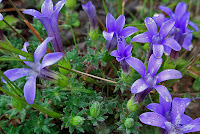 |
| Cyananthus incanus, another nectar source |
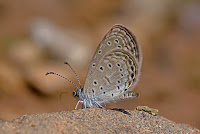 |
| Chiang Dao Nature Sanctuary, Chiang Mai, Thailand |
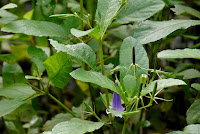 |
| Ruellia tuberosa, a popular larval host |
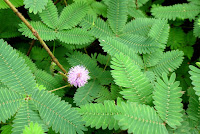 |
| Mimosa pudica, another larval host |
Links to other pages in this series for species in the same subfamily
